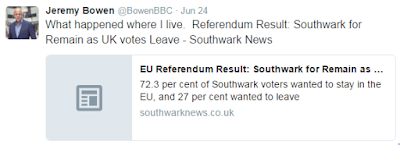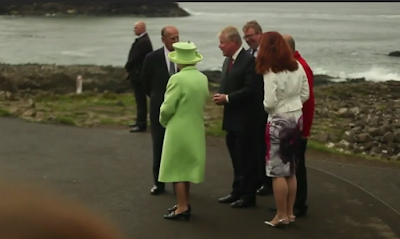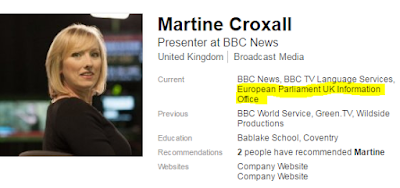Mark Mardell's latest website article in the wake of the Brexit vote focuses on "society's sharp divides".
It's classic MM, in that it doubtless believes itself to be impartial and to be acting as the 'BBC voice of reason' throughout whilst being riddled with bias from start to finish.
Allow me to explain (with apologies, at some length)...
It begins by saying that the referendum has been a bad thing, socially-speaking. It's done harm in itself and made even worse the problems that were there before:
The referendum has carved our country into two camps, sharpened existing divisions, and created some new ones.
And "a silence, a vacuum, an absence" has followed immediately, politically-speaking. And "chaos", "the great divide", "betrayal" are facing us in coming months.
His first link takes us to passionate pro-European Anne Applebaum in the Washington Post. He then links the Tea Party to Trump, and then both of them to the "I want my country back" tendency here in the UK.
The words "I want my country back" are "a code", he tells us. They could mean this or it could mean that, but in the US "for some, it is a yearning for a time there was a white man in the White House, and official signs weren't in Spanish" - i.e it's simply racism.
And immediately after whistling at any passing dogs with that 'racism' hint he writes:
We heard the same slogan in the referendum too.
Work out the British meaning yourself.
Nudge, nudge, wink, wink.
Ah but...the irony is that it's now "another lot who feels they have lost their country" (linking to the New Statesman). "To describe these people as "bad losers" is to miss the point", write Mark (linking, in a contradictory spirit, to Richard Littlejohn, boo!, in the Daily Mail, double boo!)
Ah but...the irony is that it's now "another lot who feels they have lost their country" (linking to the New Statesman). "To describe these people as "bad losers" is to miss the point", write Mark (linking, in a contradictory spirit, to Richard Littlejohn, boo!, in the Daily Mail, double boo!)
It's then on the "heartless" grief and agony of the losing Remain side - an agony "sharpened by the apparent increase in assaults on people assumed to be foreign or immigrants", which "many who voted Remain...may suspect" is a result of Brexit.
All the ways to stop Brexit are then mentioned. And Mark says that Leave supporters would have reacted just as furiously and tried just as hard to overturn the referendum result if they'd lost.
Or so he admits he "assumes". (I'm not so sure that Leave supporters would have behaved like that. Some would, but I suspect not anywhere near so many).
"Everyone" might soon be really "betrayed" and "left behind" Mark continues, just as cheerfully.
Mr. BBC Impartiality then looks at the issues through Labour's problems before sketching out the two 'outlooks' in doubtless unconsciously loaded language, eg:
Leavers tend to believe in a strong unitary state, based at Westminster, ruling over the whole of the UK.
They dislike devolution and the EU in equal measure, and believe not so much in the old British Empire, but in what some have called the English Empire.
Those in the "Remain" camp tend to be more relaxed about more diffused sovereignty and identity, and with power either devolved down to the nations that make up our country, or up to supra-national organisations such as the EU.
And then ol' Cheery Chops ends by returning to the 'badness' of the referendum 'and that which it hath wrought':
Referendums tend to be a device to keep divided parties together.
This one has not only torn the parties asunder but divided the people.
It is hard to see how the political process over the next few months and years will serve to heal it.
Incidentally, his previous BBC website piece Brexit: The story on an island apart, written a day after the result, is cut from similar cloth - though doing a James Naughtie and clothing the bias in 'historical' and 'literary' perspective.
Its framing device is to cite John of Gaunt's famous paean to England from Richard II (his 'this sceptred isle' speech). It begins positive, but ends negative:
We see ourselves as separate, and so we shall soon be cut out of councils and commission that are still shaping a continent. Some in Brussels may reflect smugly on how John of Gaunt's speech in Richard II concludes: "That England that was wont to conquer others/Hath made a shameful conquest of itself."
In between, while trying (briefly) to be 'fair' about Eurosceptics, he argues that - for everyone but the UK - the EU has been "a bulwark against history, against horror". "For all its bureaucracy", the EU "is a deeply romantic project", Mark says.
Then he lists all the reasons why we Brits are considered wrong-headed. They cried when they heard that we wanted to leave them. (We wouldn't do that, Mark said). They speak English. We've won over the EU's economic agenda. They've treated us with kid gloves. Etc....
....and Mark Mardell, as so often, steps out from merely 'reporting' into 'editorialising'. After citing Neil Kinnock joking that "the EU changed forever when the Swedes arrived and started saying "good morning" in the lift", Mark writes:.
One might think that is trivial. But maybe it highlights something we rarely realise in our desire for hard power - the extent of our soft power.
(The "perhaps" in that paragraph is unlikely to fool anyone, I suspect!)
And on MM goes, listing yet more of our 'successes' regarding the EU's direction. And, having made that point (at length) he then writes:
Now we want to be outside the whole shebang. Don't be surprised if the instinct of some is to make sure that we feel some discomfort on our way out.
(Aren't we ungrateful! And haven't we got it coming!)


































